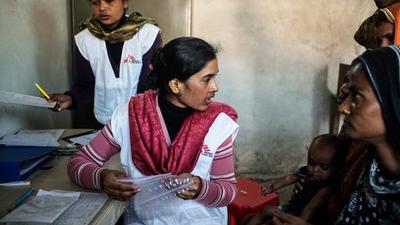From today, treatment for kala azar will only take two hours. Single-dose liposomal amphotericin B, commonly referred to as SD LAmB, has now been made available in local health centres in Bihar as the preferred treatment for kala azar (visceral leishmaniasis - VL). Bihar is one of the states in India where kala azar is highly endemic.
Médecins Sans Frontières/Doctors Without Borders (MSF) extends its full support to the government of Bihar in implementing the new treatment protocol of administering single-dose LAmB (10mg/kg) as the preferred first-line medicine to patients diagnosed with kala azar.
Single dose treatment solves access issues
This new treatment programme is now available in all government local health facilities in Bihar. The use of single-dose LAmB is a shift from the previous treatment protocol of Miltefosine which needed to be administered orally over a period of 28 days.
Due to the distance to health facilities, and climatic, social and economic factors, the number of people unable to follow the treatment for 28 days has been high. Single-dose LAmB is an effective treatment administered through intravenous infusion, which will be given to the patients over a two-hour period.
This makes LAmB a more patient-friendly drug as a single point of care that can be given to all categories of patients, including pregnant women and young children and can be administered at different healthcare levels (local health centres and hospitals).
Eliminating kala azar
“This treatment is free, safe and effective. With only one dose, large numbers of patients affected by this disease that is fatal if left untreated, making it a positive step forward towards elimination of kala azar in the region,” says Nines Lima, MSF’s tropical medicine advisor.
Gradually, all local health centres in the most endemic areas of Bihar will be able to diagnose and treat kala azar patients using single-dose LAmB.
This paves the way for providing safer treatment for kala azar and towards achieving elimination by reducing the annual incidence to less than one case per 10,000 at the provincial level.
MSF on the frontline of 'fatal' disease
Transmitted by the bite of a sand fly, kala azar is a vector-borne disease, endemic in 76 countries around the world. Typically, the disease thrives in impoverished areas and is almost always fatal if left untreated.
In India, Bihar is the epicentre of kala azar where 33 out of 38 districts are affected. The population at risk is nearly 35 million in approximately 11,500 villages spread over 429 provincial blocks.
MSF has been on the frontline of fighting kala azar in Bihar since 2007, and has treated, free of charge, more than 11,000 patients to date with LAmB and has achieved high cure rate results.
The organisation extends its support to the Ministry of Health and Family Welfare (MoHFW), the National Vector Borne Disease Control Programme (NVBDCP), the Rajendra Memorial Research Institute (RMRI), and the Kalacore consortium, in the drive to eliminate kala azar and contribute to improving the health status of at-risk populations living in the endemic areas in India.



